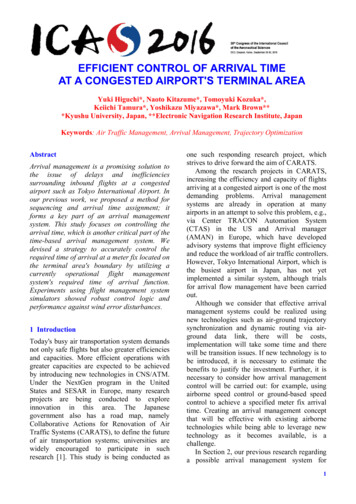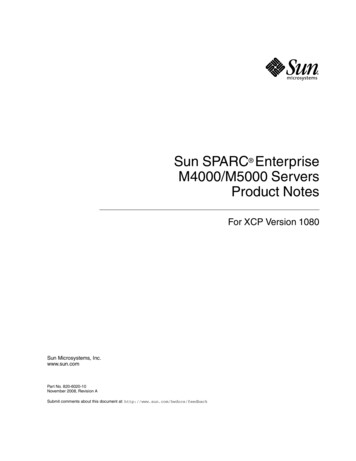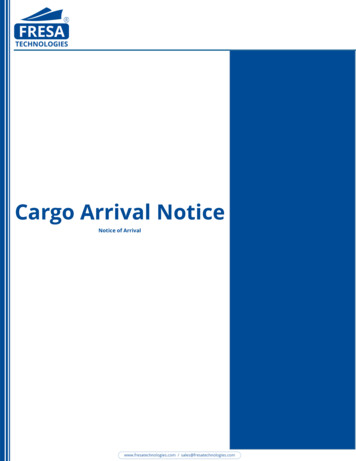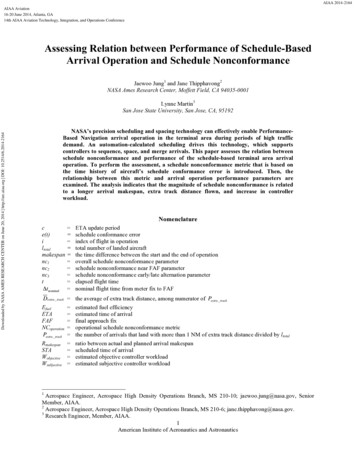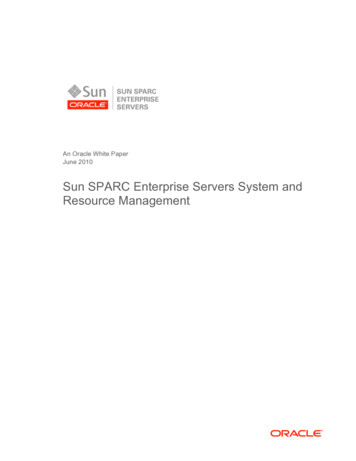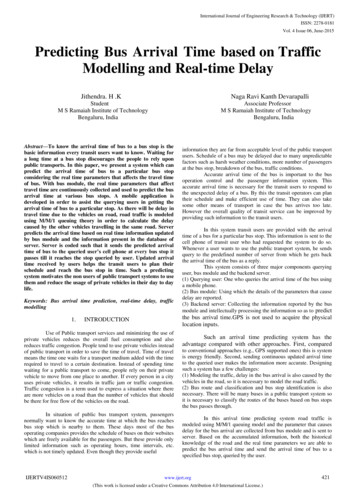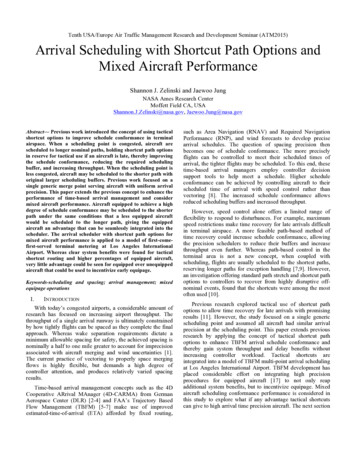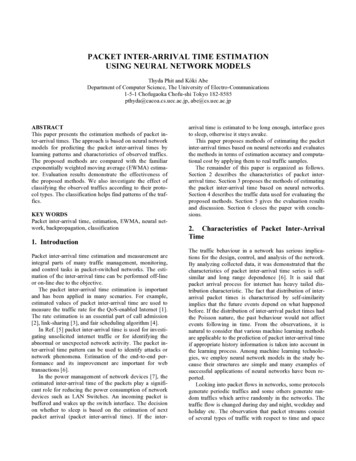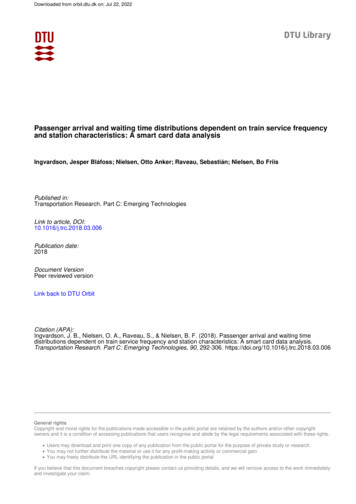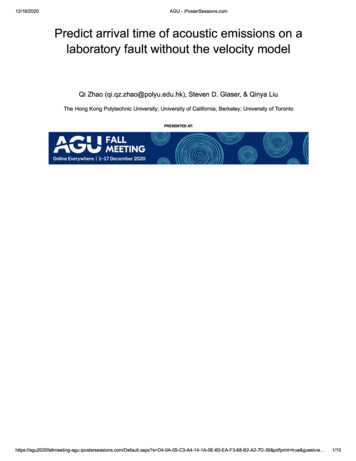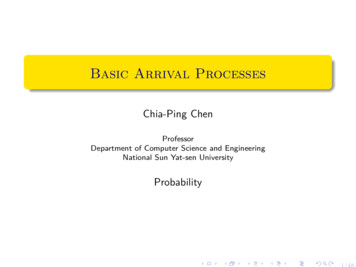
Transcription
Basic Arrival ProcessesChia-Ping ChenProfessorDepartment of Computer Science and EngineeringNational Sun Yat-sen UniversityProbability1/48
OutlineRandom processArrival processBernoulli processPoisson processRandom sum and arrival process2/48Chen PBasic Arrival Processes
Bernoulli Processes3/48Chen PBasic Arrival Processes
random processesLet (Ω, F, P ) be a probability model. A random process defined onΩ, say X, has the following property.X contains random variables, each defined on ΩA random variable of X has an indexXt is the random variable with index tX is discrete-time if the set of index is discreteX is continuous-time if the set of index is continuousAn ω in Ω is mapped to an instance of X called sample sequence or sample function4/48Chen PBasic Arrival Processes
arrival processesLet (Ω, F, P ) be a probability model. An arrival process defined onΩ, say X, has the following property.Every Xt is a Bernoulli random variableXt 1 for an arrival at t and Xt 0 for no arrival at tWe can use arrival processes for 2-state phenomenon.speech activityanomalous sound detectionvirus screening5/48Chen PBasic Arrival Processes
Definition (Bernoulli processes)Let (Ω, F, P ) be a probability model. A Bernoulli process, say X,has the following property.X is a discrete-time arrival processXt indicates whether there is an arrival at epoch tXt ’s are iid Bernoulli random variablesSince every Xt is Ber(p) for some p, we can denote X byBernoulli(p)6/48Chen PBasic Arrival Processes
Example (6.1 Bernoulli process)Let X be a Bernoulli process.Let U be the arrival count of X from time 1 to 5 and V bethe arrival count of X from time 6 to 10. We have U V.Let W be the first odd time index with an arrival of X andY be the first even time index with an arrival of X. We haveW Y.7/48Chen PBasic Arrival Processes
Lemma (binomial arrivals and geometric arrival time)Let X be Bernoulli(p).Let Sn be the arrival count of X from time 1 to time n.Sn Bin(n, p)Let T be the first arrival time of X.T Geo(p)We have Sn X1 · · · Xn where Xi ’s are iid Ber(p). SoSn Bin(n, p)The PDF of T isP (T n) P ((X1 0) · · · (Xn 1 0))P (Xn 1) (1 p)n 1 p8/48Chen PBasic Arrival Processes
fresh-start/memoryless propertyLet X be Bernoulli(p).Let n be a non-negative integer. Let X 0 be the part of Xdiscarding X1 , . . . , Xn , i.e.Xt0 Xn t , t 1, 2, · · ·Then X 0 is Bernoulli(p).Let N be a non-negative integer random variable that is independent of XN 1 , XN 2 , . . . . Let X 00 be part of X discardingX1 , . . . , XN , i.e.Xt00 XN t , t 1, 2, · · ·Then X 00 is Bernoulli(p).9/48Chen PBasic Arrival Processes
Example (6.2)A time-slotted computer executes a priority job with probability p ineach slot, independent of other slots. A slot is busy if the computerexecutes a priority job, idle otherwise. A string of idle slots, flankedby busy slots, is an idle period. A string of busy slots, flankedby idle slots, is a busy period. Let’s look at the random variablesT, B, I, Z as shown in the following figure.10/48Chen PBasic Arrival Processes
T, B, I, ZT is the time of the first idle slot. Since a slot is idle withprobability (1 p), T is Geo(1 p).B is the length of the first busy period. Let X be Bernoulli(p),treating busy slots as arrivals. Let N be the time of the firstbusy slot. The first busy period ends as soon as an idle slot arrives after N . Let X 0 be the part of X discarding X1 , . . . , XN .Then X 0 is Bernoulli(p). Since B equals the time of the firstidle slot of X 0 , it is Geo(1 p).I is the length of the first idle period. This period ends whena busy slot arrives after the first idle slot. So I is Geo(p).Z is the time of the first idle slot after the first busy slot. SinceZ B 1 1 B, we have Z Geo(1 p).11/48Chen PBasic Arrival Processes
Example (6.3)Let X be Bernoulli(p). Let N be the first time that an arrivalof X immediately follows the previous arrival of X. What is theprobability of no arrivals in the next two time slots, i.e.P (XN 1 0 XN 2 0)N is independent of XN 1 , XN 2 , . . . . Let X 0 be the part of Xdiscarding X1 , . . . , XN , i.e.Xt0 XN t , t 1, 2, · · ·Then X 0 is Bernoulli(p). ThusP (XN 1 0 XN 2 0) P (X10 0 X20 0) P (X10 0) P (X20 0) (1 p)212/48Chen PBasic Arrival Processes
Definition (arrival and interarrival times)Let X be an arrival process.The time of an arrival of X is an arrival timeThe time between an arrival and the previous arrival of X isan interarrival timeLet Yk be the time of the kth arrival of X, and Tk be the timebetween the (k 1)th arrival and the kth arrival of X. ThenYk T1 · · · Tk13/48Chen PBasic Arrival Processes
Lemma (geometric interarrival times)Let X be Bernoulli(p) and Tk be the kth interarrival times of X.Then T1 , T2 , · · · are iid Geo(p) random variables.From T1 Y1 and Y1 Geo(p), we haveT1 Geo(p)Let X 0 be X re-started at T1 and Y10 be the first arrival time of X 0 .By the memoryless property, X 0 is Bernoulli(p) and Y10 is Geo(p).From T2 Y10 , we haveT2 Geo(p)By same argument, Tk 1 is the first arrival time of a restarted process of X restarted at N Yk , so Tk 1 is Geo(p).14/48Chen PBasic Arrival Processes
Example (6.4)It has been observed that after a rainy day, the number of daysuntil it rains again is a geometric random variable with parameter p,independent of the past. Find the probability that it rains on boththe 5th and the 8th day of the month.Let X be an arrival process, treating rainy days as arrivals. The iidinter-arrival times Geo(p) implies X is Bernoulli(p). ThusP (X5 1 X8 1) P (X5 1) P (X8 1) p215/48Chen PBasic Arrival Processes
Lemma (Pascal arrival times)Let X be Bernoulli(p) and Yk be the kth arrival time of X.The PMF of Yk can be derivedIt is the Pascal PMF of order k with parameter pEvent (Yk n) occurs if and only if that there are (k 1) arrivalsfrom time 1 to time (n 1) and an arrival at time n. Thus(k 1) arrivals from time 1 to time (n 1)zpYk (n) !} {n 1 k 1p (1 p)n 1 (k 1) k 1 ! n 1 pk (1 p)n k , k 1 0,an arrival at time nz} {pn k, k 1, . . .otherwise16/48Chen PBasic Arrival Processes
Example (6.5)In every minute Lin plays, he commits a foul with probability p. In agame, he plays until he’s fouled out or he plays 30 minutes at most.What is the PMF of his playing time Z in a game?Let X be Bernoulli(p), treating fouls as arrivals. Let Yk be the ktharrival time of X. Then we have Z min(Y6 , 30) and((Z n) HencepZ (n) (Y6 n), 6 n 29(Y6 30), n 30 pY6 (n), 29P1 0,n0 66 n 29pY6 (n0 ),n 30otherwise17/48Chen PBasic Arrival Processes
Definition (split Bernoulli process)Let X be Bernoulli(p) and W , Z be defined as follows: an arrivalof X is an arrival of W with probability q, otherwise it is an arrivalof Z.We have P (Wt 1) P (Xt 1) · q pq, soWt Ber(pq) W Bernoulli(pq)SimilarlyZ Bernoulli(p(1 q))18/48Chen PBasic Arrival Processes
Definition (merge Bernoulli process)Let X be Bernoulli(p), Z be Bernoulli(q) and X Z. Let anarrival of X or an arrival of Z be an arrival of W .We haveP (Wt 1) P ((Xt 1) (Zt 1)) P (Xt 1) P (Zt 1) P ((Xt 1) (Zt 1)) p q pqSo Wt ’s are iid Ber(p q pq), and W is Bernoulli(p q pq).19/48Chen PBasic Arrival Processes
Poisson Processes20/48Chen PBasic Arrival Processes
DefinitionPoisson processLet (Ω, F, P ) be a probability model. A Poissonprocess X defined on Ω has the following property.X is a continuous-time arrival processArrivals in non-overlapping periods are independentArrival process is homogeneous in time21/48Chen PBasic Arrival Processes
Bernoulli arrivals in a small periodLet X be a Poisson process and N (δ) be the arrival count of X ina small period of length 0 δ 1. By assumption, the PMF ofN (δ) is 1 λδ o(δ), k 0P (N (δ) k) λδ o(δ),k 1 o(δ),k 1This is denoted byX Poisson(λ)N (δ) Ber(λδ)22/48Chen PBasic Arrival Processes
arrival rateLet X be Poisson(λ).The expected number of arrivals of X in a small period oflength δ isE[N (δ)] λδ o(δ)The instantaneous rate of arrivals is λlimδ 0 E[N (δ)] λδ23/48Chen PBasic Arrival Processes
Lemma (Poisson arrivals in a period)Let X be Poisson(λ). The arrival count of X in a period of lengthτ is Poi(λτ ).Let N (τ ) be the arrival count in a period of length τ . Partition theperiod into small periods of length δ nτ with n 1. Let Ni bethe arrival count in the ith small period. We have Ni Ber(λδ)and N (τ ) N1 · · · Nn . Hencen N (τ ) Bin(n, λδ) Poi (nλδ) Poi (λτ )24/48Chen PBasic Arrival Processes
Example (6.8)Bill gets e-mails according to Poisson(λ) with λ 0.2 messagesper hour. He checks email every hour. What is the probability of nonew message? 1 new message?Since N (τ ) is Poi (λτ ), we haveN (1) Poi(0.2 1)25/48Chen PBasic Arrival Processes
Example (6.9)Arrivals of customers at a supermarket are modeled by Poisson(λ)with λ 10 customers per minute. Let M (resp. N ) be the numberof the customers arriving between 9:00 and 9:10 (resp. between 9:30and 9:35). What is the PMF of M N ?M is Poi(λτ1 ) Poi(10 · 10), N is Poi(λτ2 ) Poi(10 · 5), andM N . The sum of 2 independent Poisson random variables is aPoisson random variable. Thus(M N ) Poi(100 50)26/48Chen PBasic Arrival Processes
Lemma (exponential first arrival time)Let X be Poisson(λ). The time of the first arrival of X is Exp(λ).Let Y1 be the first arrival time of X and N (t) be the number ofthe arrivals in (0, t). Note (Y1 t) if and only if (N (t) 0). SoP (Y1 t) P (N (t) 0) andP (Y1 t) 1 P (Y1 t) 1 P (N (t) 0)Since N (t) is Poi(λt), we haveP (N (t) k) (λt)k λte , k 0, 1, 2, . . .k!So the CDF of Y1 isFY1 (t) 1 P (N (t) 0) 1 e λtwhich is the CDF of Exp(λ). Therefore, Y1 is Exp(λ).27/48Chen PBasic Arrival Processes
fresh-start/memoryless propertyLet X be Poisson(λ).Let u 0 and X 0 be the part of X discarding X u , i.e.Xt0 Xu t , t 0Then X 0 is Poisson(λ).Let U be a non-negative random variable and be independentof X U . Let X 00 be the part of X discarding X U , i.e.Xt00 XU t , t 0Then X 00 is Poisson(λ).28/48Chen PBasic Arrival Processes
Example (6.10)You and a partner go to the gym to play badminton. You wait untilthe on-court players to finish. Assume that their playing time isExp(λ). Then your waiting time is Exp(λ), regardless of how longthey have been playing.Let X be Poisson(λ) which starts at the same time as the playerson court. Their playing time is Exp(λ), so it is the first arrival timeof X. Let X 0 be the process obtained from restarting X at thesame time as you begin to wait. Then your waiting time is the firstarrival time of X 0 . Since X 0 is Poisson(λ), your waiting time isExp(λ).29/48Chen PBasic Arrival Processes
Example (6.11)When you enter a bank, all 3 tellers are busy serving customers,and there are no other customers in queue. No more customersenter the bank after you. Assume that the service times for thebank customers are iid exponential random variables. What is theprobability that you will be the last customer to leave the bank?1 1? ?4 330/48Chen PBasic Arrival Processes
Lemma (exponential interarrival times)Let X be Poisson(λ) and Tk be the kth interarrival time of X.Then T1 , T2 , · · · are iid Exp(λ) random variables.This follows from the memoryless property.That is, by restarting X at an arrival time, the next arrival timeis Exp(λ) and is an interarrival time of X.An instance of X can be generated as follows: for k 1, 2, . . .sample interarrival timeTk Exp(λ)and set Xt to 1 at arrival timeYk T1 · · · Tk31/48Chen PBasic Arrival Processes
Lemma (Erlang arrival times)Let X be Poisson(λ) and Yk be the kth arrival time of X.The PDF Yk can be derivedIt is the Erlang PDF of order k with parameter λWe have(k 1) arrivals in (0, t)z} {1 arrival in (t, t δ)z} {P (Yk (t, t δ)) P (N (t) k 1) P (N (δ) 1)(λt)k 1 λte (λδ o(δ))(k 1)! FYk (t δ) FYk (t) So the PDF of Yk isfYk (t) limδ 0 λk tk 1 λtFYk (t δ) FYk (t) eδ(k 1)!32/48Chen PBasic Arrival Processes
Example (6.12)You call IRS hotline and are the 56th person waiting to be served.Suppose the callers’ departure is Poisson(λ) with λ 2 per minute.How long do you expect to wait until your service starts, and whatis the probability that the waiting time is more than 30 minutes?Let W be the waiting time, X be Poisson(λ) for callers’ departures,and Tk be Exp(λ) for the kth interarrival time of X. ThenW T1 · · · T56 Y56We haveE[W ] E[T1 · · · T56 ] E[Ti ] · 56 andP (W 30) P (Y56 30) 1· 56 28λZ 56 552 t 2te dt30(55)!33/48Chen PBasic Arrival Processes
Definition (split Poisson process)Let X be Poisson(λ) and the arrivals of X be split as follows. Anarrival of X is an arrival of W with probability q, otherwise it is anarrival of Z.Let N (δ) be the number of the arrivals of W in a period oflength δ. P (N (δ) 1) [λδ o(δ)]q (λq)δ o(δ) P (N (δ) 0) [1 λδ o(δ)] · 1 [λδ o(δ)] · (1 q) 1 (λq)δ o(δ) P (N (δ) k) o(δ),k 2 W Poisson(λq)SimilarlyZ Poisson(λ(1 q))34/48Chen PBasic Arrival Processes
Definition (merge Poisson process)Let X be Poisson(λ1 ) and Z be Poisson(λ2 ). Let W be theprocess obtained by merging the arrivals of X and Z.Let N (δ) be the number of the arrivals of W in a period of lengthδ. We haveP (N (δ) 0) (1 λ1 δ o(δ))(1 λ2 δ o(δ)) 1 (λ1 λ2 )δ o(δ)P (N (δ) 1) λ1 δ(1 λ2 δ) (1 λ1 δ)(λ2 δ) o(δ) (λ1 λ2 )δ o(δ)P (N (δ) k) o(δ),k 2Hence W is Poisson(λ1 λ2 ).35/48Chen PBasic Arrival Processes
Example (6.13)The arrivals of packets at a network node is modeled as Poisson(λ).An arrived packet is either a local packet with probability q or a transit packet with probability 1 q, independent of other arrivals andindependent of the arrival times. Then the arrivals of local packetsis Poisson(λq). The arrivals of transit packets is Poisson(λ(1 q)).36/48Chen PBasic Arrival Processes
Example (6.14)Customers arrive at a post office according to Poisson(λ1 ) to mailletters, or according to Poisson(λ2 ) to mail packages.Customers arrive at the post office according toPoisson(λ1 λ2 )A customer wants to mail a letter with probabilityλ1λ1 λ237/48Chen PBasic Arrival Processes
Example (6.15)Let the lifetimes of two light bulbs Ta and Tb be independentExp(λa ) and Exp(λb ). Let T be the first time that a bulb burnsout. What is the PDF of T ?T min(Ta , Tb ) (T t) (Ta t Tb t) P (T t) P (Ta t Tb t) 1 P (T t) e λa t e λb t P (T t) 1 e (λa λb )t FT (t) 1 e (λa λb )tSo T is Exp(λa λb ) and E [T ] (λa λb ) 1 . Note Ta isthe first arrival time of Poisson(λa ), Tb is the first arrival timeof Poisson(λb ), and T is the first arrival time of the merged processPoisson(λa λb ).38/48Chen PBasic Arrival Processes
Example (6.16)Let the lifetimes of three light bulbs be iid Exp(λ). What is theexpected value of the time until all bulbs burn out?Let Tk be the time between the (k 1)th burn-out and the kthburn-out. There are (3 k 1) (4 k) light bulbs during thatperiod. From Example 6.15, we are merging (4 k) Poisson(λ)’s,and the first arrival time of the merged process isTk Exp((4 k)λ)The time until all bulbs burn out is T1 T2 T3 , with expectationE [T1 T2 T3 ] E [T1 ] E [T2 ] E [T3 ] (3λ) 1 (2λ) 1 (λ) 139/48Chen PBasic Arrival Processes
Random Sum and Arrival Processes40/48Chen PBasic Arrival Processes
random sumLet X1 , X2 , · · · be random variables and N is a non-negative integerrandom variable. We consider the random sum defined byS X1 · · · XN41/48Chen PBasic Arrival Processes
random sum and split Bernoulli processLet Z be a Bernoulli process and Z 0 be the Bernoulli process obtained from splitting the arrivals of Z.The first arrival time of Z 0 can be seen as a random sumThe arrival count of Z 0 can be seen as a random sumrandom sum and split Poisson processLet W be a Poisson process and W 0 be obtained from splitting thearrivals of W .The first arrival time of W 0 can be seen as a random sumThe arrival count of W 0 can be seen as a random sum42/48Chen PBasic Arrival Processes
geometric sum of geometricsLet T1 , T2 , . . . be iid Geo(p) and N be Geo(q). We have(T1 · · · TN ) Geo(pq)Let Z be Bernoulli(p) and Z 0 be obtained from splitting the arrivalsof Z with probability q. Then Z 0 is Bernoulli(pq). Let Y10 be thefirst arrival time of Z 0 . From the perspective of Z 0 , we haveY10 Geo(pq)From the perspective of Z, we haveY10 T1 · · · TNwhere N Geo(q) is the arrival count of Z until the first arrival ofZ 0 occurs and Ti is the ith interarrival time of Z. Hence(T1 · · · TN ) Geo(pq)43/48Chen PBasic Arrival Processes
binomial sum of BernoullisLet X1 , X2 , . . . be iid Ber(q) and N be Bin(m, p). We have(X1 · · · XN ) Bin(m, pq)Let Z be Bernoulli(p) and Z 0 be obtained from splitting the arrivalsof Z with probability q. Then Z 0 is Bernoulli(pq). Let N 0 be thearrival count of Z 0 in [1, m]. From the perspective of Z 0 , we haveN 0 Bin(m, pq)From the perspective of Z, we haveN 0 X1 · · · XNwhere N Bin(m, p) is the arrival count of Z in [1, m] and Xiindicates whether the ith arrival of Z is an arrival of Z 0 . Hence(X1 · · · XN ) Bin(m, pq)44/48Chen PBasic Arrival Processes
geometric sum of exponentialsLet T1 , T2 , . . . be iid Exp(λ) and N be Geo(q). We have(T1 · · · TN ) Exp(λq)Let W be Poisson(λ) and W 0 be obtained from splitting the arrivalsof W with probability q. Then W 0 is Poisson(λq). Let Y10 be thefirst arrival time of W 0 . From the perspective of W 0 , we haveY10 Exp(λq)From the perspective of W , we haveY10 T1 · · · TNwhere N Geo(q) is the arrival count of W until the first arrivalof W 0 occurs and Ti is the ith interarrival time of W . Hence(T1 · · · TN ) Exp(λq)45/48Chen PBasic Arrival Processes
Poisson sum of BernoullisLet X1 , X2 , . . . be iid Ber(q) and N be Poi(λ). We have(X1 · · · XN ) Poi(λq)Let N 0 be the number of the arrivals of W 0 in (0, 1). From theperspective of W 0 , we haveN 0 Poi(λq)From the perspective of W , we haveN 0 X1 · · · XNwhere N Poi(λ) is the arrival count of W within (0, 1), and Xiindicates whether the ith arrival of W is an arrival of W 0 . Hence(X1 · · · XN ) Poi(λq)46/48Chen PBasic Arrival Processes
Summary: Bernoulli ProcessesBernoulli process with arrival probability pX Bernoulli(p), Xn Ber(p)# of arrivalsSn Bin(n, p)Interarrival timeTn Geo(p)Splitting/merging arrivalsY Bernoulli(pq), W Bernoulli(p q pq)47/48Chen PBasic Arrival Processes
Summary: Poisson ProcessesPoisson process with arrival rate λX Poisson(λ), N (δ) Ber(λδ)# of arrivalsN (τ ) Poi(λτ )Interarrival timeTn Exp(λ)Splitting/merging arrivalsY Poisson(λp), W Poisson(λ1 λ2 )48/48Chen PBasic Arrival Processes
14/48 Lemma (geometric interarrival times) Let X be Bernoulli(p) and T k be the kth interarrival times of X. Then T 1,T 2,···are iid Geo(p) random variables. From T 1 Y 1 and Y 1 Geo(p), we have T 1 Geo(p) Let X 0be X re-started at T 1 and Y 1 be the first arrival time of X 0. By the memoryless property, X 0is Bernoulli(p) and Y 1 is Geo(p). From T 2 Y0 1, we have T 2 Geo(p .
